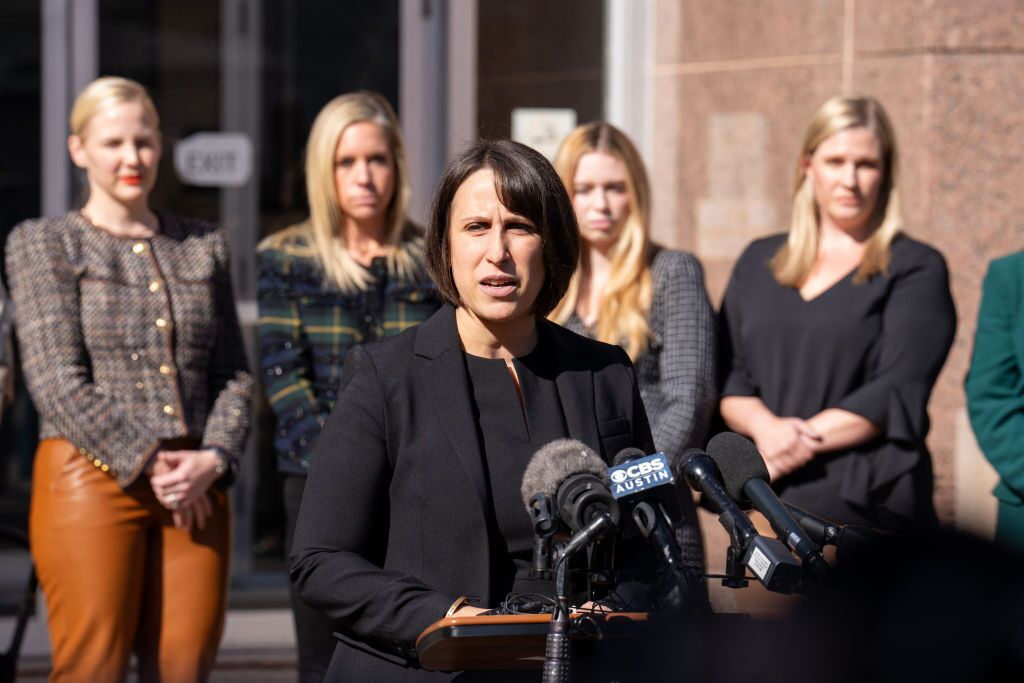Currently awaiting the governor’s signature, SB 31 could shift how Texas treats some medical emergencies in pregnancy—but legal risks persist.
This article was originally published by Courier Texas, under the headline “Will a New Abortion Bill Save the Lives of Pregnant Women in Texas?”
Will a new bill in Texas stop the shocking number of deaths of pregnant women in the Lone Star State? That’s the hope of both Democratic and Republican supporters of SB 31, also known as the Life of the Mother Act. The bill is headed to the desk of Gov. Greg Abbott for signature, and there is a strong expectation that he will sign it.
Ever since Texas’ abortion ban, SB 8, also known as the Texas Heartbeat Act, was passed in 2021—at the time, the most restrictive abortion ban to ever take effect in the U.S.—both medical providers and many Texas women have begged the state legislature for more clarity on what “medical emergencies” qualify for a legal abortion.
The goal of SB 31, which garnered broad bipartisan support, is to respond to the pressure to provide clarity about legal medical exceptions, allowing Texas doctors to perform lifesaving abortions and D&C (dilation and curettage) procedures on pregnant and miscarrying women in need of medical care.
There are currently no exceptions for women who become pregnant by rape or incest, or if they are carrying fetuses with fatal fetal anomalies, under the state’s total abortion ban. An abortion is only permitted when a physician determines that a pregnant patient has an imminent life-threatening condition that could only be relieved through receiving an abortion. Physicians who have been found to perform an abortion outside the narrow exception face severe penalties—up to 99 years in prison, $100,000 in fines, and the loss of their medical license.
Maternal mortality has skyrocketed by 56 percent since the Texas Legislature imposed the 2021 ban, and cases of life-threatening sepsis infections soared by 50 percent in women hospitalized after pregnancy losses in the second trimester.
Three of the victims of the state’s abortion bans were healthy young women who miscarried much-wanted babies in major hospital emergency rooms, where they were denied urgent standard treatments—even as their loved ones pleaded with doctors to save their lives.
Porsha Ngumezi, a mother of two, bled to death, while 18-year-old Nevaeh Crain and 28-year-old mother of one Josseli Barnica both succumbed to virulent infections.
Since 2022, when Roe v. Wade was overturned and triggered abortion bans across the country, OB-GYNs have described to Courier Texas how they are “working in an environment of extreme fear” as they try their best to provide high quality women’s reproductive health care under exceptionally difficult conditions in the state.
The new SB 31 bill is finally an effort to provide more assurance to doctors, hospitals and other medical providers so they will feel confident that they won’t be arrested for performing life-saving abortion care.
Supporters say they believe SB 31 will save the lives of pregnant women—yet many doctors still report uncertainty, and reproductive freedom advocates tell Courier Texas that the bill does not go far enough to address the loss of bodily autonomy suffered by women in the state.
The Problems SB 31 Is Supposed to Solve
SB 31 updates all of Texas’ abortion laws to make the rules about medical emergencies clearer and more consistent.
Right now, Texans live under multiple abortion bans, each with their own wording about when an abortion is allowed to save a woman’s life. SB 31 attempts to clear up confusion by making the emergency exceptions in each law the same.
Here’s a look at the confusing language that has trapped medical providers and women in Texas for the past few years.
Human Life Protection Act of 2021
HB 1280, also known as the “Human Life Protection Act of 2021,” was triggered and went into effect following the Supreme Court’s 2022 overturning of Roe v. Wade, which federally protected abortion. The trigger ban only deems an abortion as legal if, “in the exercise of reasonable medical judgement, the pregnant female has a life-threatening physical condition … arising from a pregnancy that places the female at risk of death or poses a serious risk of substantial impairment of a major bodily function unless the abortion is performed.”
This language has left doctors and hospitals fearful that their efforts to provide the abortions and miscarriage care they felt were medically necessary could be judged as “unnecessary”—and the results of this fear have been deadly. Twenty-two women sued the state in 2023, in the Zurawski v. State of Texas case, in an attempt to clarify the guidance on HB1280’s “medical emergency” exceptions. One of the plaintiffs, Amanda Zurawski, nearly died from sepsis when her water broke at 18 weeks into her pregnancy. Another plaintiff, Samantha Casiano, was forced to carry an unviable baby and watch it suffocate to death after birth. Still other plaintiffs fled the state to abort fetuses suffering from fatal fetal anomalies.
The Texas Supreme Court ruled against the Zurawski plaintiffs, noting that abortions are not legal in cases where a fetus has a lethal condition.
A few months later, the Texas Legislature attempted to give doctors the legal go-ahead to perform abortions when a woman’s water breaks far too early for the fetus to have any hope of surviving. This is medically known as “preterm premature rupture of the membranes,” or PPROM, and life-threatening infections like sepsis can occur in the pregnant mother.
The legislature also tried to give physicians the legal ability to end ectopic pregnancies, which can never develop into a living baby but, when left untreated, can cause death. However, the legislature’s definition of ectopic pregnancies didn’t cover all types of ectopic pregnancies, according to doctors.
Therefore, in both situations, physicians could be charged with providing an abortion and would have to “affirmatively” defend themselves against the charge.
SB 31’s Changes to the Human Life Protection Act
With the new SB 31 (the Life of the Mother Act), doctors would now be instructed to use their “reasonable medical judgement” to provide an abortion when the pregnant woman has a life-threatening physical condition—before the pregnant woman suffers from any effects of the risk.
In other words, a woman would no longer have to present with an “imminent” risk of death or a “substantial impairment of a major bodily function” before a doctor could provide an abortion. Supporters of SB 31 say that it’s designed to help patients like Zurawski plaintiff Cristina Nuñez of El Paso, who suffered from diabetes, cardiovascular issues, and end state renal disease when she became pregnant accidentally. Despite her arm turning black from blood clotting issues, and a looming risk of a pulmonary embolism—not to mention the possibility of losing her arm—it was 11 days before a hospital finally gave her an abortion.
Under SB 31, doctors would no longer have to delay or withhold treatment provided to a pregnant person if the delay could result in a greater risk of a woman’s death, or “substantial impairment of a major bodily function.”
SB 31 would also allow doctors to:
- exercise their reasonable medical judgement to remove an ectopic pregnancy, and
- “remove a dead unborn child whose death was caused by a spontaneous abortion.”
However, critics say this clause doesn’t provide clarification for situations when a fetus that is miscarrying retains a heartbeat, like Amanda Zurawski’s unborn child, Willow. Zurawski’s water broke at 18 weeks, but because her baby’s heart was still beating, she was sent home from the hospital to wait until she developed signs of an infection. Three days later, Zurawski became delirious and spiked a high fever, and doctors battled for another three days to save her life as she fought a massive sepsis infection.
Will SB 31 Open the Door to Prosecuting Women Who Get an Abortion—or Their Families?
A previous law by the Texas state government allowed for women who receive an abortion to be prosecuted—and some confusion exists as to whether SB 31 would open that door or close it.
The law is from an abortion ban dating to before the Civil War. While it was written into the state’s first penal code in 1857, it’s frequently referred to as the “1925 abortion ban” because Texas recodified and republished its abortion statutes in 1925.
That law criminalized both the act of performing an abortion and “furnishing the means” for an abortion, which was vaguely worded enough to be interpreted as including the pregnant woman herself, as well as anyone assisting her or educating her about abortion. Anyone convicted of “furnishing the means” for an abortion under the 1925 law would face between two to five years in prison.
The 1925 abortion ban had become a “zombie” law on Texas’ books, but became active again when Roe v. Wade was overturned. In fact, Texas Attorney General Ken Paxton issued a statement saying the 1925 ban was “good law” and that abortion providers could be criminally liable under the pre-Roe law. Then, about two months after Roe was overturned, the Human Life Protection Act went into effect, instituting an even stricter abortion ban and harsh penalties for assisting women seeking abortions.
In the text of SB 31, the bill’s author, Republican Sen. Bryan Hughes, made two references to the 1925 ban, allegedly to clarify that women who have abortions would not be prosecuted.
However, attorneys suggest that SB 31’s attempts at clarification could do the opposite—by amending the language in the Human Life Protection Act, SB 31 could revive the 1925 ban, which states: “Whoever furnishes the means for procuring an abortion knowing the purpose intended, is guilty as an accomplice.”
“The pre-Roe 1925 ban does not have an explicit exception saying that pregnant women can’t be prosecuted for getting an abortion,” said Bella Pori, an attorney with the Center for Reproductive Rights, “so there was a fear that the pre-Roe ban could be used now to prosecute pregnant people who travel for abortion care,” if they pay for their own travel, or if they order and pay for their own abortion pills.
Molly Duane, another lawyer for the Center for Reproductive Rights, agreed with Pori. She explained to Courier Texas that attorney Jonathan Mitchell, the former Texas solicitor general who conceived of the SB 8 Texas abortion ban, has argued in a separate case, Silvia v. Carpenter, that “a woman who obtained abortion pills violated the 1925 law, because there is no prohibition in the law excluding pregnant women.”
However, Texas attorney Amy Bresnen points out to Courier Texas that “a woman has never been prosecuted in the state of Texas” for receiving an abortion.
Intensive lobbying efforts by the Zurawski v. Texas plaintiffs, who report they were terrified that Texas women would be criminalized, as well from Democratic lawmakers, pushed bill author Sen. Hughes to add new language to SB 31, intended to clarify that the bill would not be used to prosecute pregnant women.
Today, the bill includes that SB 31 “shall not be construed to affirm or reject the validity” of the 1925 law. “The [Texas] Legislature makes the amendment solely to ensure medical care may be provided to a pregnant woman in a medical emergency.”
The Zurawski Plaintiffs’ Reactions to SB 31
Kaitlyn Kash; Austin, Texas:
“I appreciate the good faith efforts that have been made to address our concerns. It is my understanding that the new language makes the 1925 law less of a threat to pregnant women. It appears that SB 31 won’t be used to prosecute pregnant women. However, the bill still doesn’t address the fact that members of a woman’s support system, like her husband, can still be prosecuted for ‘furnishing the means for an abortion’ if they help her leave the state for the procedure.”
Amanda Zurawski; Austin:
“First and foremost, I’m really grateful that our elected officials listened to our concerns and worked on this bill. We are grateful that this is a step in the right direction. We knew that this would be a long process. Abortion bans and restrictions are not helpful to doctors. We’ll see how the bill plays out in practice. Before SB 31, there was confusion among doctors about when they could provide abortions.”
Lauren Miller; Dallas:
“The bottom line is you don’t do abortion bans if you care about the ‘life of the mother.’ At first, I was optimistic when I heard about SB 31, but I was disappointed once I read it. I don’t see how it would have improved my situation. I was pregnant with twins and one was unviable. I couldn’t get a single fetal reduction in Texas and I was at high risk of miscarrying both twins without it. To save my healthy son I had to flee to Colorado for the procedure. SB 31 wouldn’t have saved my son Henry since it doesn’t allow for abortions of fetuses with fatal fetal anomalies. I would have been sentenced to be trapped in a hospital until I would have lost both my sons.”
Texas OB-GYNs React to SB 31
Dr. Todd Ivey; Houston:
“I like the bill. Is it a perfect bill? It is not. We do not have rape, incest or lethal fetal abnormalities covered. But this is a huge step in the right direction to protect the women of Texas and to protect the doctors who care for them.”
“I think this bill gives me clarity and it gives a lot of the people I work with clarity. We know now that we can use our reasonable medical judgement if something is life-threatening or potentially life-threatening, and we don’t have to wait until a pregnant female suffers any effects from a risk she has.”
“One pregnant patient (in a difficult situation) a few months ago looked at me and said, ‘I don’t want to die, please don’t let me die.’ I reassured her but she was absolutely terrified. I want these situations to stop. I do not want women and physicians to be frightened.”
Dr. Tony Ogden; San Antonio:
“I think the bill will help for a limited segment of patients, particularly those who have ectopic pregnancies or PPROM. Also, physicians and the staff will be able to talk more freely with patients when this might be a life-threatening emergency.”
“I still have concern that they haven’t addressed rape, incest and lethal fetal anomalies, and these are critical. There are still problems with trying to legislate health care. Health care is not a black and white situation, scenarios develop. You know in the moment, at three in the morning when you’re dealing with situations, the penalties that are associated are so severe—I think they’ll still give some people pause, in situations like that.”
Democratic Lawmaker Donna Howard, Co-Sponsor of SB 31, Reacts
“I wouldn’t say that I’m happy about it. This is not a ‘choice’ bill. I would have loved to do more. It does not address fatal fetal anomalies, rape or incest. But what we could do was to clear up confusion for doctors by clarifying that doctors can intervene to save women’s lives by using their ‘reasonable medical judgement.’ Death doesn’t need to be imminent. We can’t let the perfect get in the way of the good. This is something we could do.”
“We were able to address the 1925 zombie law. There was concern among advocates that it could criminalize women seeking abortions. The bill doesn’t revive or rescind the 1925 bill.”
“I know that this bill isn’t all that (pro-choice) advocates want, but if this allows me to save the lives of Texas moms, I’m going to do it.”
“Doctors feel better but not happy. Clearly, even with SB 31, their practice of medicine is still compromised. They can’t practice medicine the way they were trained, but we worked with the Texas Medical Association and they support this.”
“To make more progress than this, we need to wait for different election outcomes.”
Top Repro Health Care Lawyers Disagree on Whether SB 31 Helps
Molly Duane, attorney for the Center For Reproductive Rights, who argued Zurawski v. State of Texas in front of the Texas Supreme Court:
“As soon as the trigger ban is amended with SB 31, it arguably breathes new life into the 1925 abortion law and into the words, ‘furnishing the means for procuring an abortion.’ I think the language added to SB 31 is a feeble way of addressing the concern that people could be prosecuted. It doesn’t explicitly say that a pregnant person can’t be prosecuted and it can also apply to people assisting a pregnant person get an abortion. If the 1925 ban is enforced, people assisting a pregnant person could be criminally prosecuted. Fear is the point. The more things are left vague, the more fear there is throughout the state.”
“I still think that doctors using their own ‘reasonable medical judgement’ can still be susceptible to second guessing and it doesn’t seem that a woman at risk of losing her fertility would qualify for a medical exception abortion. Most of my clients had a fatal fetal anomaly diagnosis and this bill won’t help them at all.”
Amy Bresnen, attorney representing Texas Campaign for Mothers, and Lisa Kaufman, attorney with the Texas Civil Justice League. Both worked on the language in the final bill:
“We are in Texas, we aren’t in a blue state where we can get all our rights back from a medical perspective. We have to gain back a little at a time…what we’re doing is trying to fix abortion statutes to have this clear exception that says the medical community can engage when there’s a medical emergency and that the woman doesn’t actually have to get sick.”
“There have been six pro-life groups that have been part of the conversation about this bill and they’ve all signed on to the language in the bill about not prosecuting women. And we have never prosecuted women for getting an abortion in the state of Texas.”
“This is a maternal health bill so to the extent that a fatal fetal abnormality is having a negative impact on her health, this bill does protect her. Also the bill should cover women with cancer and an issue like heart disease, because they are potentially life-threatening conditions.”
“With this bill, women still won’t get the treatment they need 100 percent of the time, but we feel that fewer women will die.”
Austin Kaplan, civil rights attorney who represented Kate Cox when she sought an abortion for an unviable fetus; also co-counsel for Zurawski v. State of Texas:
“People like Kate Cox will still need to flee the state if they can. Then this bill also does nothing to help women pregnant with twins—one unviable and one healthy twin. It’s inconsistent with ‘life.’ You might lose three lives in these situations. Are we comfortable with the system where we’re putting a mother and a healthy child at significant risk, just for the outside chance of a miracle for the child with a fatal fetal anomaly?”
!function(f,b,e,v,n,t,s)
{if(f.fbq)return;n=f.fbq=function(){n.callMethod?
n.callMethod.apply(n,arguments):n.queue.push(arguments)};
if(!f._fbq)f._fbq=n;n.push=n;n.loaded=!0;n.version=’2.0′;
n.queue=[];t=b.createElement(e);t.async=!0;
t.src=v;s=b.getElementsByTagName(e)[0];
s.parentNode.insertBefore(t,s)}(window,document,’script’,
‘
fbq(‘init’, ‘200522034604820’);
fbq(‘track’, ‘PageView’);
Great Job Bonnie Fuller & the Team @ Ms. Magazine Source link for sharing this story.









